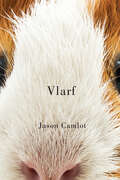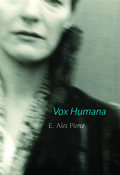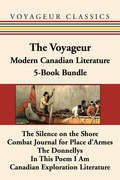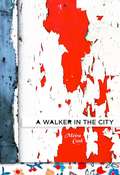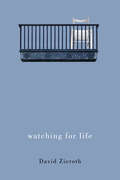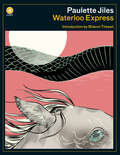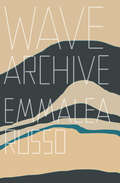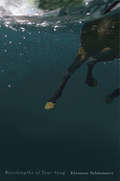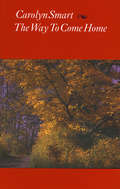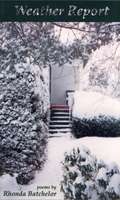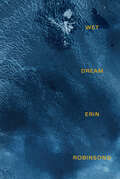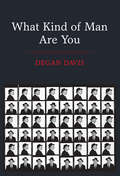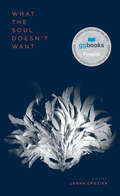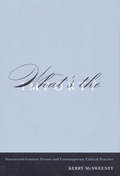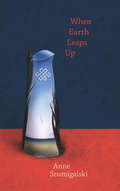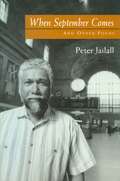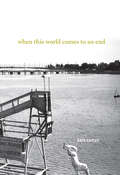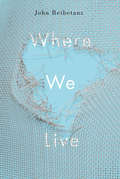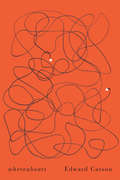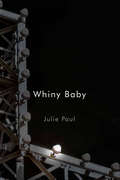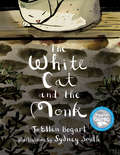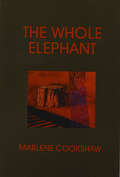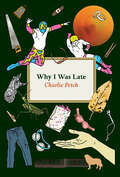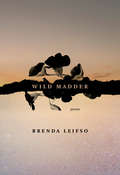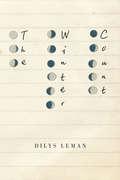- Table View
- List View
Vlarf (Hugh MacLennan Poetry Series #66)
by Jason CamlotHolmes entered the cabinet / of the respectable reverend / (who was in fact a closet naturalist) / and found so many Victorian things.In the early 2000s flarf poetry emerged as an avant-garde movement that generated disturbing and amusing texts from the results of odd internet searches. In Vlarf Jason Camlot plumbs the canon of Victorian literature, as one would search the internet, to fashion strange, sad, and funny forms and feelings in poetry.Vlarf pursues expressions of sentiment that may have become unfamiliar, unacceptable, or uncool since the advent of modernism by mining Victorian texts and generic forms with odd inclinations, using techniques that include erasure, bout-rimé, emulation, adaptation, reboot, mimicry, abhorrence, cringe, and love. Erasures of massive volumes of prose by John Stuart Mill and John Ruskin become concise poems of condensed sadness; a reboot of Christina Rossetti’s “Goblin Market” is told from the perspective of a ten-year-old boy with an imaginary albatross pal; recovered fragments from an apocryphal book of Victorian nonsense verse are pieced together; a Leonard Cohen song about Queen Victoria is offered in a steampunk rendering; and a meditative guinea pig delivers a dramatic monologue in the vein of Robert Browning.Camlot moves through Victorian literature as a collector in a curiosity shop, seeking the oddest forms of feeling in language to shape them into peculiarly affective poems.
Vox Humana
by E. Alex PiercePoems of great passion and tenderness, as close to rapture as a writer can get and still hold on. E. Alex Pierce's voice can be heard echoing down the long corridors of memory and myth. It's not that these poems live in the past; instead, they manage to bring it back to life with uncanny sensual details and an urgency that makes you realize some fires never really go out. Vox Humana is all lilt and discipline in its courtliness, its surrender to the theatre of the moment at its most alive.
The Voyageur Modern Canadian Literature 5-Book Bundle: The Silence on the Shore / Combat Journal for Place d'Armes / The Donnellys / In This Poem I Am / Canadian Exploration Literature
by Hugh Garner Paul Stuewe James Reaney Alan Filewod Robin Skelton Harold Rhenisch Germaine Warkentin Scott Symons Christopher ElsonVoyageur Classics is a series of special versions of Canadian classics, with added material and new introductions. In this bundle we find five classic works of twentieth century fiction, drama and poetry, a period when Canada’s literary identity was shaped. Originally published in 1962, The Silence on the Shore is considered by many critics to be renowned Hugh Garner’s best, most ambitious novel. Originally published in 1967, Combat Journal for Place d’Armes was initially met with shock and anger by most reviewers but has become a literary touchstone. The Donnellys tells the tale of a secret society and a massacre that shocked the Canadian public, a story overlooked by the artistic community until Reaney’s 1975 play elevated the events to the level of legend. In This Poem I Am presents the best of poet Robin Skelton’s adventurous poetry. And Exploration Literature is a groundbreaking collection of early writing inspired by the opening of a continent, an entry point into the beginnings of a literate response to the awe and wonder inspired by an unfolding geography. Includes Canadian Exploration Literature Combat Journal for Place d’Armes The Donnellys In This Poem I Am The Silence on the Shore
A Walker in the City
by Méira CookShortlisted for the 2012 Aqua Lansdowne Prize for Poetry A fascinating, ambling, loitering mystery story in verse, a whoizzit rather than a whodunit. In this innovative and arresting narrative poem, Méira Cook's walker, a young woman, is a character being written by an "old city poet," who is in turn being written by another poet, for whom the young woman, "Ms. Em Cook," has been an amanuensis. Always witty and often hilarious, feather-light in touch, the book is an entertaining exploration of serious issues: youth and age; life, death and rebirth; the (dis)connection of language and reality; tradition and the now. It is an assemblage of seven nesting sections, each of them a sort of chapbook speaking to each of the others and rounding out a long poem of great freshness. A Walker in the City is one of a kind, one of the most original books Brick has ever published.
watching for life (Hugh MacLennan Poetry Series)
by David Zierothwe climb down the manhole / where history waits, and we can read / its layers or at least imagine themFrom a balcony overlooking an urban back lane, a poet watches those walking below – their identities unknown and yet grasped through real and imagined evidence of foibles and personal inclinations, details of habit that reflect the strangers’ inner selves, humanity in all its weaknesses, illnesses, and propensities. In watching for life David Zieroth ponders questions about how to live and how to continue. The poems reach out in imagining the lives of others, and the poet himself is watched in turn. Zieroth conjures the history of his environment and the people who pass through it, reminding us of “the place we occupy / unfinished within ourselves” and our hunger to locate ourselves in the strangers we encounter. Intimate and observant, watching for life features poetic reflections on men, women, children, crows and gulls, pigeons, rain and snow, patched pavement, delivery trucks, night, and time.
Waterloo Express (A List)
by Paulette JilesThe remarkable debut poetry collection from renowned bestselling novelist and Award–winning poet Paulette Jiles, reissued in a handsome A List edition.Originally published in 1973, Paulette Jiles’s first collection amazed audiences with its rare depth of texture and verbal dexterity. Her work moves through landscapes that range from Africa to Mexico to Toronto with the ease of a travelling magician. Her swift, intricate metaphors leave the reader breathless, but her work also manages to be straight, earthy, vernacular, and disturbingly perceptive.
Wave Archive
by Emmalea RussoIs it possible to archive the invisible symptoms of an illness? Is the archive emotional? Emmalea Russo's Wave Archive moves between essay and poetry while also pondering the mind-body connection and the unreliability of thought patterns and histories. Here, Russo invokes her own experiences with seizures, photographs and art-making, archival and indexical processes, brain waves, and the very personal need to document and store while simultaneously questioning the reliability of memory and language. Drawing upon the history of epilepsy in both ancient and modern brain treatments, Wave Archive disrupts and restores the archive over and over again, exploring the very edges of consciousness.
Wavelengths of Your Song (Hugh MacLennan Poetry Series)
by Eleonore SchönmaierAt night we swim / following the fence: / diverted / we enter the net / shaped like a heart / and in the heart the hook / guides us to the back A stunning unfolding of memory, Wavelengths of Your Song juxtaposes a childhood in the northern Canadian wilderness with the adventures of an international creative life. Genuine environmentalism is at the heart of this collection. Migrations of birds and humans lend their songs to the vivid writing and a tangible, sensory reality emerges from their sounds. Music by Beethoven and Rzewski, paintings by Norval Morrisseau and Kandinsky, and writing by Kafka and Celan, inspire Eleonore Schönmaier's poetry. She takes the reader on unexpected journeys skiing across frozen lakes, cycling along Dutch canals, or hiking in Malta and New Zealand. With surprising, at times breathtaking connections, she illuminates hot air ballooning, canoe camping, planting trees on Vienna rooftops, and the bathing of a black horse in the North Sea. In poems that travel extensively around the globe, in lists for living well, and in love letters, Eleonore Schönmaier takes the reader on a journey along the wavelengths of the ocean, sound, and the physics of light.
The Way to Come Home
by Carolyn SmartThe Way to Come Home is Carolyn Smart's fourth book of poems. It is a collection that ranges from celebrating the rural landscape north of Kingston, Ontario to re-creating the painful last phase of her friend Bronwen Wallace's life in a moving sequence titled "The Sound of the Birds." The volume's opening sequence, "Cape of Storms," views the hatred thriving amid the astonishing physical beauty of South Africa while "The woman is bathing" details a journey to Costa Rica that is a journey into the self. The outward eye is as acute as the inward in this powerful book.
Weather Report
by Rhonda BatchelorLike the shifting and often turbulent skies of our own emotional meteorology, Rhonda Batchelor’s poems forecast the shifting patterns of a marriage from quiet moments of a graceful dawn to stormy seas of absence, from brilliant love-strewn sunshowers to dark moments of loss and bitter nights upon the shore. In three sections, "Backbone of the Moon", "Ghostly Dialogues" and "Still Breathing", Batchelor explores the fleeting forever trilogy of expectations, unions and releases that comprise the tidelike phases of a lover’s cycle. Dedicated to respected Canadian poet Charles Lillard, Batchelor’s late husband, this work keens to the notes of a personal lament but emerges triumphantly healed and ultimately blessed.
Wet Dream
by Erin RobinsongWet Dream is an expansive, erotic, and enlivening book of ecological thinking. Wet Dream is an expansive book of ecological thinking for living on a wet planet on fire. Erotic and political, vibrating with pleasures, medicines, and unrest, these poems metabolize toxic logics and traverse enmeshed ecologies through the wetness that connects. A pulse of agency to the heart. "Wet Dream is brain lube for an insurgent language—creaturely poems that remake your body and relation to the world. I want to smear them all over." — Astrida Neimanis, author of Bodies of Water: Posthuman Feminist Phenomenology
What Kind of Man Are You
by Degan DavisWhat does it mean to be a man now? These poems’ answers are bold and deeply moving.
What the Soul Doesn't Want
by Lorna CrozierIn her newest collection, Lorna Crozier describes the passage of time in the way that only she can. Her arresting, edgy poems about aging and grief are surprising and invigorating: a defiant balm. At the same time, she revels in the quirkiness and whimsy of the natural world: the vision of a fly, the naming of an eggplant, and a woman who — not unhappily — finds that cockroaches are drawn to her. “God draws a life. And then rubs it out / with the eraser on his pencil.” Lorna Crozier draws a world in What the Soul Doesn’t Want, and then beckons us in. Crozier’s signature wit and striking imagery are on display as she stretches her wings and reminds us that we haven’t yet seen all that she can do.
What's the Import?: Nineteenth-Century Poems and Contemporary Critical Practice
by Kerry McSweeneyKerry McSweeney critiques such readings of Romantic, Victorian, and 19th-century American poems. In What's the Import? he proposes and exemplifies an aesthetic or intrinsic critical model rooted in literary-historical contextualization that considers the determination of meanings to be only one of the qualities that full engagement with a poem requires. His wide-ranging study discusses poems by Wordsworth, Keats, Tennyson, Browning, Whitman, Dickinson, Carroll, Dante and Christina Rossetti, Swinburne, Hopkins, Hardy, and the Michael Field poets. What's the Import? contributes to the current debates in North America about the state and direction of English studies and the teaching of literature in general.
When Earth Leaps Up
by Anne SzumigalskiEdited by Mark Abley; Preface by Hilary Clark; Afterword by Mark Abley This posthumous collection will be a delightful surprise for readers who thought they had heard the last of Anne Szumigalski's nimble, sideslipping, otherworldly voice. Szumigalski's poetic universe is as beguiling and unpredictable as dreams and myth, and like them, her universe can be enchanting, visually lush, and suddenly dangerous. The poems deal with ultimate questions. What is time? What is memory? Is it invented or real? Is death a kind of dream? Is life? Is God a man, a woman, or a Sacred Reptile? The imaginative leaps in When Earth Leaps Up are as easy as looking up at the prairie sky, as simple as turning your head to the side to catch a glimpse of an idea as it skips past you in the form of an interesting stranger, a passing cloud, the face of a loved one, long dead.
When September Comes: And Other Poems
by Peter JailallPeter Jailall continues his search for the place called home in his third volume of poetry, exploring the "open, dangerous" landscape of a post-September 11th world. In this climate of globalization, none are untouched by the threats of terrorism or the spoils of modernization and its effect on our environment. As poet, teacher and storyteller, Peter’s unique gift for the blending of language – from Caribbean-accented English to Hindi – allows him to paint beautiful dichotomies between the Guyana of his birth, and the Canada that is his current home. "To those of us in the worldwide Guyanese diaspora, Peter’s poetry is cultural regeneration and joy. It generates the anchorage of identity and self respect in a sea of uncertainty and adjustment. To our host communities it provides insights into who we are as persons. It encourages the realization that hopes, fears, and aspirations are common across cultures and all are worthy of understanding and respect. To all who read Peter’s work come challenges to thought and imagination, glowing pride, and prolonged pleasure." – Judaman Seecoomar, PhD, Author "Peter Jailall speaks poignantly to problems of identity and the painful feelings associated with movement and change in this fine new collection. He examines past and present and points to our need to find out and accept who we really are before cultural identity can be recognized."– Bob Barton, Storyteller, writer, educator (OISE, University of Toronto)
When This World Comes to an End
by Kate CayleyKate Cayley’s is a mind both studious and curious, deeply attuned to the question “what if?” What if Nick Drake and Emily Dickinson met in the afterlife? What if a respected physician suddenly shrank to the size of a pea? What if the blind twins in a Victorian photograph could speak to us? What if we found another Earth orbiting another sun? Cayley draws on her experience as a playwright to create vividly engaging voices and characters ranging from the famous to the infamous to the all-but-anonymous. With exquisite pacing and striking imagery she draws us into the gaps in history, invites us to survey its wonders, both real and imaginary.
Where We Live (Hugh MacLennan Poetry Series #8)
by John Reibetanzshell in the night sky / and whose anti-clockwise spiral / repeats the Milky Way’s unwinding / informed not with the lore of clocks or teachers / but of gods and children Where We Live explores how specific places and their features (street scenes, classrooms, furniture, creatures both real and mythical) become part of our identities, and illustrates how we carry them around and how we are shaped by their outlines even as we, in turn, transform them. This reciprocity extends to the adoption of other voices in the translated poems that are a vital part of each section, and to the active participation of the reader invited by the collection’s flexible use of poetic form. John Reibetanz’s approach comes from a conviction that the most compelling and significant features of human identity are not primarily found in solitude but rather evolve through our conversations with otherness. This collection works as a kind of long poem, its three parts interconnected, each presenting a particular interpretation of the process of possession, loss, and recovery. “Thresholds” deals with encounters between the self and the other – childhood experiences, family, familiar places – and seeks ways of transcending the disappointment within such sources. “Roommates” explores both the uniqueness and the reciprocity in human relationships with the natural world, and “Flyways” posits that there is no separation between the human/natural and the imaginative: however far-flung, they all interweave and constitute the territory where we live.
whereabouts (Hugh MacLennan Poetry Series #61)
by Edward Carsonin the poem / of the world / there once / was a map / of the map / composed in / the likeness / of a poemIn this riddling and seeking book of poems, Edward Carson navigates the emotional, often contradictory intelligence of the heart and mind. In three interrelated segments, whereabouts powerfully charts the tight emotional spaces between thinking and language, beauty and perception, love and the polemics of self and other.Taking on cartographic distortions and dynamics of the map metaphor, "thereabouts (or the mapmaker's dilemma)" playfully confronts the quandaries of personal navigation when the wants and needs of the esemplastic mind are forever devising new places to be. Exploring the brain, its neurons, and serpentine synaptic connections, "hereabouts (in fourteen scans)" advances a poetry of rhizomic communication capturing networks of thought and feeling that spring from both conflict and caress. Within a relationship's countless masquerades and revelations, "whereabouts (the lovers' discourse)" invites the reader to eavesdrop on a series of intimate conversations wherein lovers argue and act out their richly populated inner lives, addressing issues of gender, pleasure, communication, control, and sex.
Whiny Baby (Hugh MacLennan Poetry Series)
by Julie PaulChomping / champing / championing / churlish / … / There’s a wolf at the door / that looks exactly like meWho is the “whiny baby” in this book? Rather than calling names or hurling insults, the candid poems in this collection most often implicate the poet herself.Expansive in form and voice, the poems in Julie Paul’s second collection offer both love letters and laments. They take us to construction sites, meadows, waiting rooms, beaches, alleys, gardens, and frozen rivers, from Montreal to Hornby Island. They ask us to live in the moment, despite the moment. Including a spirited long poem that riffs on the fairy tale “Three Billy Goats Gruff,” these poems are like old friends that at once console and confess. They blow kisses, they remember, and they celebrate the broken and the lost alongside the beautiful.At turns frank, peevish, introspective, and mischievous, the poems share sincere and intimate perspectives on the changing female body, our natural and built landscapes, and the idiosyncrasies of modern life. Whiny Baby calls on us to simultaneously examine and exult in our brief time on earth.
The White Cat and the Monk: A Retelling of the Poem “Pangur Bán”
by Jo Ellen BogartA monk leads a simple life. He studies his books late into the evening and searches for truth in their pages. His cat, Pangur, leads a simple life, too, chasing prey in the darkness. As night turns to dawn, Pangur leads his companion to the truth he has been seeking.The White Cat and the Monk is a retelling of the classic Old Irish poem “Pangur Bán.” With Jo Ellen Bogart’s simple and elegant narration and Sydney Smith’s classically inspired images, this contemplative story pays tribute to the wisdom of animals and the wonders of the natural world.
The Whole Elephant
by Marlene CookshawShortlisted for the 1990 Dorothy Livesay Award for Poetry (BC Book Prizes) Marlene Cookshaw is a Cheshire cat of a poet whose naturally realized details illuminate a shifting wholeness on the "singing edge" between dream and waking. Hers is a quilted language at once covering and revealing our fascinating ordinariness. The long poem "In The Swim" subtly captures the desperate and humourous beauty of a seemingly plain life closely observed. Other poems leap with deftness and daring across the open plain of our lives, leaving images so strong, so strange, they verge on myth.
Why I Was Late
by Charlie PetchWith kitchen-table candour and empathy, Charlie Petch's debut collection of poems offers witness to a decades-long trans/personal coming of age, finding heroes in unexpected places. Why I Was Late fuses text with performance, brings a transmasculine wisdom, humour, and experience to bear upon tailgates, spaceships, and wrestling rings. Fierce, tender, convention re-inventing—Petch works hard. And whether it's as a film union lighting technician, a hospital bed allocator, a Toronto hot dog vendor, or a performer/player of the musical saw, the work is survival. Heroes are found in unexpected places, elevated by both large and small gestures of kindness, accountability and acceptance. No subject—grief, disability, kink, sexuality, gender politics, violence—is off limits. A poet so good at drag they had everyone convinced that they were a woman for the first forty years of their life, Petch has somehow brought the stage and its attendant thrills into the book. Better late than. And better. "Charlie Petch's Why I Was Late is a poetic debut with the wisdom of a sage and the emotional range of an expert comedian. … Do yourself a favor and read this book. This is a master at work."—Kai Cheng Thom, author of I Hope We Choose Love: A Trans Girl's Notes from the End of the World
Wild Madder
by Brenda LeifsoPoems that stride bravely into the day-to-day, recovering the misdirected intensity at its core. Brenda Leifso’s Wild Madder is about way-finding—through those moments in which you no longer recognize where you are. It’s about not knowing—who you are anymore, how to be in the world, how to love. It’s about what’s unspoken and about what speaks—conversation with the wild and animate world. It’s about marriage, family, motherhood—the drudgery in them and the quiet beauty. This is lyric poetry wracked with pain, rage, and longing. In the beginning, the collection may read as though it’s been steeped in bitterness. Family can ask everything of a partner and parent and then turn around and take even more; Wild Madder feels like a note in a bottle washed up on the shores of a rough sea. But Leifso is not one to stand still or cling to darkness; in fact, we end up so far into the darkness that when she breaks through into light, it’s a conflagration of all the things that make us human. These frank, bracingly recognizable poems will be irresistible—and cathartic—for anyone who has ever felt their life chewing them into little pieces.
The Winter Count (Hugh MacLennan Poetry Series #30)
by Dilys LemanAlthough relatively few First Nations joined the 1885 Métis insurgence, the Canadian government reacted punitively, instituting draconian "Indian" policies whose ill-effects continue to resonate today. The Winter Count traces these developments alongside another narrative - the debate over the sanity of Métis leader Louis Riel. Dilys Leman weaves original poems and reconstituted archival texts, including medical reports, diaries, treaties, recipes, even a phrenological analysis, to create a montage that both presents and disrupts official history. Her narrative questions politically expedient myths that First Nations were allies of the Métis, would rise again in greater numbers, and needed to be scrupulously controlled to secure the opening of the West. Leman evokes the voices of historical and imagined characters to convey a political landscape teetering into lunacy and a government obsessed with its own vision of nation-building. We hear a bureaucrat extol the merits of the pass system, a court interpreter's ludicrous translation of treason felony into Cree, and Dr Augustus Jukes agonizing about his role on the secret medical commission tasked with reassessing Riel’s sanity, which would determine if he could be executed. The Winter Count is a cautionary tale about moral responsibility. As Leman laments, our failure to be accountable human beings will surely haunt us: "Laudable pus / Political speeches / This water / brought too late / to a boil / Lance and forceps / rattling / their pot"
